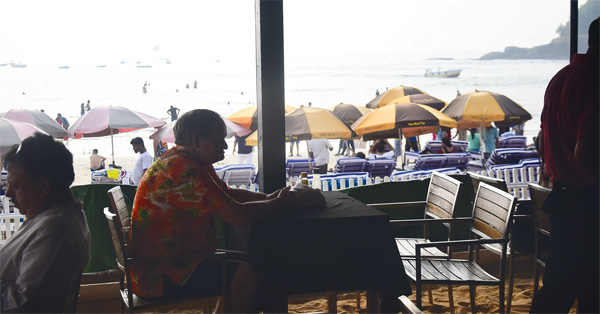With the closure of the restaurant at a popular beach shack in Anjuna having been ordered due to hygiene violations, Café looks at how things need course correction before it’s too late
One major factor that has drawn people from all corners of the globe to Goa has been its coastal attractions. Over the years, the pulling-power of the beaches seems to have diminished, and there can be no doubt that a lot of it comes down to the fact that there is often a very lacklustre approach to how best one can showcase seaside attractions in the state; shacks play a major role in this equation.
Only recently, the Food and Drugs Administration (FDA) ordered the closure of the restaurant at a popular beach shack in Anjuna, owing to the fact that its inspecting team found it to be running in an unhygienic condition. Approximately 30 deficiencies were noted by the FDA, with hygiene being a mitigating factor in the entire debacle. Food being cooked in the open, rusty fridges that weren’t operating at a required temperature, the kitchen having direct access to washrooms, and the use of food colouring agents, which are unsafe, were some of the charges in question. In addition to all of the above, the restaurant was also unable to produce the Food Safety and Standards Authority of India (FSSAI) license, it was claimed. With this case having come to light, one can only wonder what the conditions may be like at some of these establishments.
Popular chef and restaurateur Vasco Alvares has often worked with properties along the coastal belt, and recalls that on one given occasion, when called upon to work with a private party setting up a beach front affair, having to set-up a makeshift kitchen, owing to the establishment’s deplorable conditions. “The kitchen was in a poor state, and there were flies in many places. At the eleventh hour, we managed to put together a structure that would serve as a kitchen, just so that we could deliver hygienic food that I believe is the diner’s foremost right,” he shares, from experience.
But amidst the chaos and often, uncertainty of what lies beneath, there are some places that honestly stand out, in the best way possible. One such example that can quite literally be classified as ‘gold standard’ when it comes to shacks in Goa is ‘Zeebop by the Sea’, on Utorda beach in the southern reaches of the state. The proprietor of the establishment, Sergio Dias, has gone the whole hog, when it comes to ensuring a great experience all-round, for his clients. From impeccably clean washrooms, to the sand being combed at regular intervals to ensure an untouched feel, to exceedingly pleasant staff, ‘Zeebop’ has nailed their brief.
Reflecting on the endeavours that he has undertaken to meet the standards he sets for himself, Sergio says, “I’m honestly grateful of having an inborn sense of cleanliness. For me, even at a personal level, hygiene takes top priority. I’ve been fortunate to have had the opportunity to have travelled and gained exposure in the area of hospitality. My experiences in places like Brazil have been an eye-opener, where beaches are cleaned on a daily basis, in a mechanised method. If it can be done elsewhere, then we can do it here too. It is highly dependent on each one’s culture and mentality, and we all need to do our part.
James Elliott and his wife Barbara have been regular visitors to Goa for over three decades. Over a conversation held in Calangute, they revealed that they have decided to call time on their Indian expedition and move to pastures anew, given that they aren’t pleased with many of the changes that they’ve seen ‘develop’.
“My wife and I have been coming to Goa from England for over 32 years, and I do think that this will be our last trip here. There’s really nothing desirable about Goa anymore. The rates are constantly on the rise, especially when it comes to taxis and shacks. When it comes to eating out, most shacks offer sub-par food at inflated rates, and the local charm is lost, with many staff from other parts of the country being rude. That is a major change we’ve noticed. Even the Goans who worked in these areas appear calloused and jaded, and have lost the warmth that we as tourists associated with them. Hence there is nothing desirable about being by the Goan seaside anymore, and that was a major attraction. Now other parts of the world with that as their primary feature are cheaper and more inviting,” he shares.
Perhaps it’s time that the game was changed and the bar was raised. Perhaps it’s time that we demanded more from our own industry. Licensing bodies should be training shack owners before issuing licenses, to ensure there is compliance within the required norms for decent operation, else, we stand to lose a lot more, as we continue down this slippery slope that we seem to be on.
